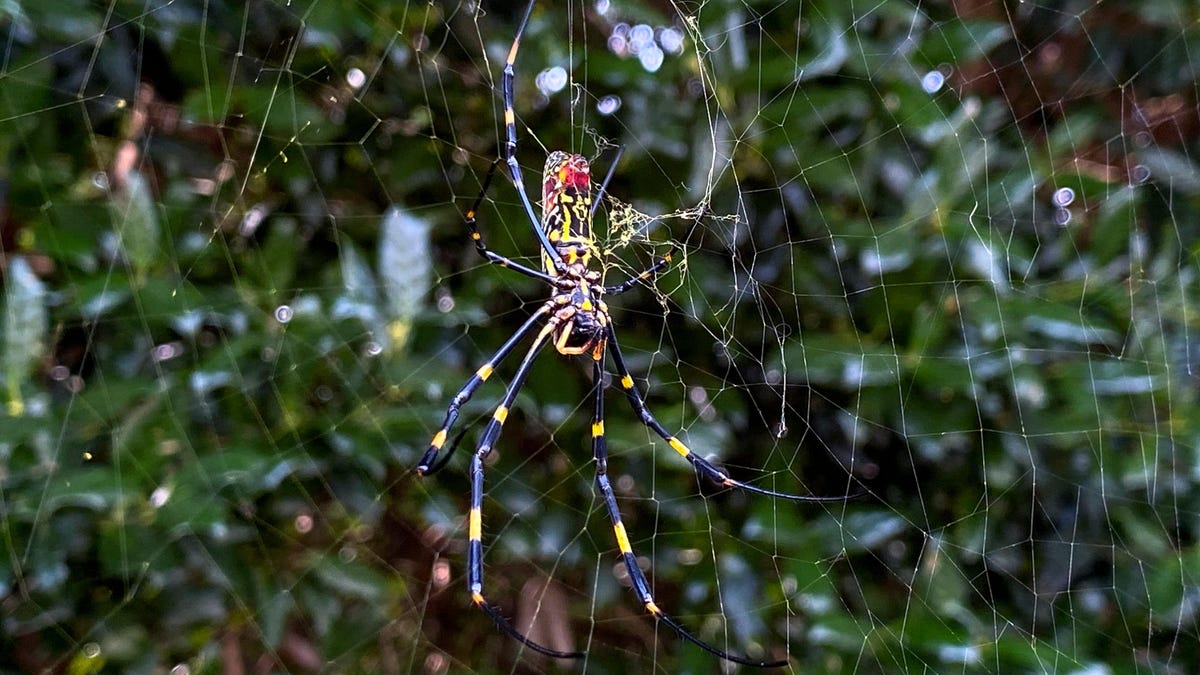
The New York tri-state area is poised to have some large eight-legged tourists this summer. Experts are warning that the invasive Joro spider (Trichonephila clavata) could soon touch down in parts of New York and New Jersey. Striking in color and size as they may be, however, the arachnids aren’t a danger to humans.
The Joro spider is common to several parts of Asia, though it holds special significance in Japan, being linked to the mythical shape-shifting creature jorogumo. The spiders weave intricate, multi-layered orb webs of yellow-golden thread. Female joro spiders are larger than the male, with a body length as long as one inch and legs as long as four inches, with a potential leg span up to eight inches. Females are additionally adorned with unique patterns of yellow, black, and red on their abdomen as well as yellow and blue/black bands on their legs.
Advertisement
Joro spiders are one of many spider species known to engage in something called ballooning, meaning they will sometimes use their webs to ride the winds miles away from their original location, usually soon after hatching. This allows them to quickly settle into new territory, provided the environmental conditions are suitable. And much of the U.S. seems plenty comfortable enough.
The spiders apparently arrived in America sometime around 2013, being first spotted in Georgia. Since then, they’ve also been seen in Alabama, Tennessee, North and South Carolina, and Maryland. Many experts expect them to populate the entire Eastern seaboard eventually, given their relatively strong tolerance to the cold that enables them to survive brief freezes in the winter. Their New York debut may happen as early as this summer.
Advertisement
“Right now, we are seeing them dispersing into Maryland, so soon enough, possibly even next year, they should be in New Jersey and New York,’’ José Ramírez-Garofalo, an ecologist in the Lockwood Lab at Rutgers University, told the Staten Island Advance last fall. “It is a matter of when, not if.”
Thankfully, these arachnids are more bark than bite. Research has suggested that Joro spiders and their relatives are some of the “shyest” spiders around, meaning they’re unlikely to be aggressive toward any perceived threats, humans included (instead, they’ll usually freeze in place, sometimes for up to an hour). And even if you managed to get one of these spiders to bite you, their mouthparts are likely too small to pierce the skin, and their venom is not considered dangerous to humans or pets.
Advertisement
We’re less certain about their environmental impact. Invasive species can often disturb the ecosystem due to having no natural predators, which can allow them to outcompete native species and voraciously deplete a region’s resources. As of yet, though, there’s no clear evidence that Joro spiders are causing much trouble and they’ve even been observed eating other problematic pests, including the spotted lanternfly (another recent invasive species). So for now, you can simply enjoy them as a new attraction to the area.
“It’s a bigger spider than we’re used to, but it has pretty colors,” Louis Sorkin, an arachnologist now retired from the American Museum of Natural History, told Gothamist over the weekend.
Advertisement
Once the eight-legged bugs do arrive in the Big Apple, they should be able to make it just fine. A study earlier this February found that Joro spiders can easily tolerate the high vibrations common to cities and busy roads, at least when it comes to their insect-preying habits.
Services Marketplace – Listings, Bookings & Reviews